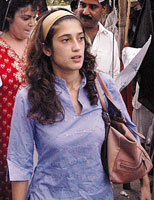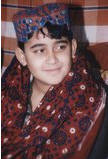Bhutto family
 From Wikipedia - Reading time: 7 min
From Wikipedia - Reading time: 7 min
| Bhutto family | |
|---|---|
 | |
| Current region | Karachi, Sindh, Pakistan |
| Place of origin | Larkana, Sindh, Pakistan |
| Current head | Bilawal Bhutto |
| Members | Shah Nawaz Bhutto Nabi Bux Bhutto Zulfikar Ali Bhutto Nusrat Bhutto Mumtaz Ali Bhutto Benazir Bhutto Murtaza Bhutto Shahnawaz Bhutto Fatima Bhutto Ameer Buksh Bhutto Zulfikar Ali Bhutto Jr. Aseefa Bhutto Bakhtawar Bhutto |
| Connected members | Zardari family |
| Estate(s) | Garhi Khuda Bakhsh |
The Bhutto family[a] is a Pakistani political family. The Bhuttos have played a prominent role in Pakistani politics and government. The family has held the leadership of the Pakistan People's Party (PPP), since its inception in 1967. The Bhuttos have been settled in Sindh for over three centuries.[1]
Two members of the family, Zulfikar and Benazir Bhutto, have been the Prime Ministers of Pakistan, whereas Asif Ali Zardari, Benazir's widower, has been the President of Pakistan twice, from 2008 to 2013 and from 2024 to present.
History
[edit]According to James P. Sterba of The New York Times, Bhutto family traces its origins to Rajput warriors from the region now known as Rajasthan, India.[2] The family converted to Islam centuries ago and migrated southwest to the area near Larkana, in present-day Pakistan, along with their livestock.[2] Mitho Khan Bhutto, an ancestor of the family, was the first to settle in the region.[2] However, it was his descendant, Sardar Pirbuksh Bhutto, who expanded the family's landholdings.[2] As a tribal chief, Sardar Pirbuksh Bhutto accumulated around 40,000 acres of land through various means, including military conquests, land purchases, and by providing labor for British canal construction projects in return for land grants.[2]
According to another account by historian Stanley Wolpert, the Bhuttos originally migrated to Sindh in the early 18th century from the neighboring region of Gujratra (now Rajasthan in India). 'Sehto' was the first member of the Bhutto family, who converted to Islam during Mughal emperor Aurangzeb's reign. Following the conversion to Islam he took the title of Khan, becoming Sehto Khan.[3] In Sindh, the Bhuttos under Sehto Khan first settled at Ratodero, a few miles north of Larkana.
Shah Nawaz Bhutto, a direct descendant of Sehto Khan, came to prominence during the British Raj as a dewan of the princely state of Junagadh in the southwestern part of Gujarat in India. During the Partition of India in 1947, the Muslim Nawab of Junagarh wanted to accede his state to the newly created Pakistan but faced a rebellion by the Hindu majority population of Junagadh. The Indian government thwarted the accession to Pakistan, and the Bhuttos had to flee to Sindh in modern-day Pakistan. Shah Nawaz Bhutto moved to Larkana District in Sindh, where his land-ownership made him one of the wealthiest and most influential persons in Sindh.[4]
Beginning the political dynasty, Shah Nawaz's third son Zulfikar Ali Bhutto (1928-1979) founded the Pakistan People's Party (PPP) in 1967 and served as the fourth President and later the ninth Prime Minister. He married an Iranian of Kurdish origin named Nusrat Ispahani. His daughter, Benazir (1953-2007), also served as Prime Minister, while his two sons, Shahnawaz Bhutto and Mir Murtaza Bhutto, were assassinated. Shahnawaz's daughter, Sassi Bhutto and Murtaza's children, Fatima Bhutto and Zulfikar Ali Bhutto Jr., are settled abroad along with their aunt Sanam Bhutto (Zulfikar Bhutto's second daughter). After Benazir's assassination on December 27, 2007, her son Bilawal Bhutto Zardari became co-chairperson in 2007 along with her widower Asif Ali Zardari.
Family tree
[edit]| Mohammad Khan | |||||||||||||||||||||||||||||||||||||||||||||||||||||||||||||||||||||||||||||||||||||||||
| Fatah Mohammad Khan | |||||||||||||||||||||||||||||||||||||||||||||||||||||||||||||||||||||||||||||||||||||||||
| Mittho Khan | |||||||||||||||||||||||||||||||||||||||||||||||||||||||||||||||||||||||||||||||||||||||||
| Mohammad Qasim Khan | |||||||||||||||||||||||||||||||||||||||||||||||||||||||||||||||||||||||||||||||||||||||||
| Abro Khan | |||||||||||||||||||||||||||||||||||||||||||||||||||||||||||||||||||||||||||||||||||||||||
| Sahato Khan | |||||||||||||||||||||||||||||||||||||||||||||||||||||||||||||||||||||||||||||||||||||||||
| Pir Bux Khan | |||||||||||||||||||||||||||||||||||||||||||||||||||||||||||||||||||||||||||||||||||||||||
| Doda Khan | |||||||||||||||||||||||||||||||||||||||||||||||||||||||||||||||||||||||||||||||||||||||||
| Khuda Bux Bhutto | |||||||||||||||||||||||||||||||||||||||||||||||||||||||||||||||||||||||||||||||||||||||||
| Ghulam Murtaza Bhutto (1862 – 1940) | |||||||||||||||||||||||||||||||||||||||||||||||||||||||||||||||||||||||||||||||||||||||||
| Shah Nawaz Bhutto (1888 – 1957) | Khursheed Begum (Lakhi Bai) | Nabi Bux Khan Bhutto (1887 – 1965) | |||||||||||||||||||||||||||||||||||||||||||||||||||||||||||||||||||||||||||||||||||||||
| Mumtaz Begum Sahiba Bhutto | Muhammad Mustafa Khan Bahadur | Zulfikar Ali Bhutto (1928 – 1979) | Nusrat Ispahani Bhutto (1929 – 2011) | Imdad Ali Bhutto | Sikander Ali Bhutto | Mashoq Bhutto | Mumtaz Ali Khan Bhutto (1933 – 2021) | ||||||||||||||||||||||||||||||||||||||||||||||||||||||||||||||||||||||||||||||||||
| Shahnawaz Bhutto (1958 – 1985) | Raehana Fassihuddin Bhutto | Sanam Bhutto (1957- ) | Nasir Hussain | Fowzia Fassihuddin Bhutto | Murtaza Bhutto (1954 – 1996) | Ghinwa Itaoui Bhutto | Benazir Bhutto (1953 – 2007) | Asif Ali Zardari (1955- ) | Ameer Bux Bhutto (1954-) | Ali Haider Bhutto | |||||||||||||||||||||||||||||||||||||||||||||||||||||||||||||||||||||||||||||||
| Sassi Bhutto | Shahmir Hussain | Azadi Hussain | Fatima Bhutto (1982- ) | Zulfikar Ali Bhutto Jr | Bilawal Bhutto (1988- ) | Bakhtawar Bhutto (1990-) | Aseefa Bhutto | ||||||||||||||||||||||||||||||||||||||||||||||||||||||||||||||||||||||||||||||||||
- Titles

According to other authors, the family migrated from Sarsa to Hissar.[5]
- Founding father Doda Khan of Pir Bakhsh Bhutto
- Khuda Bakhsh Bhutto, Ameer Bakhsh Bhutto, Illahi Bux Bhutto (Honorary Magistrate Larkana District)
- Ghulam Murtaza Bhutto, Rasul Bakhsh Bhutto
- Sir Shah Nawaz Bhutto (Member Bombay Council)
- Sardar Wahid Baksh Bhutto (Member, Central Legislative Assembly and Bombay Council, Chief of tribe)
- Nawab Nabi Bakhsh Bhutto (Member, Central Legislative Assembly)
- Khan Bahadur Ahmad Khan Bhutto
Photos
[edit]-
Bakhtawar Bhutto Zardari
See also
[edit]Notes
[edit]References
[edit]- ^ Taseer, Salmaan (1980). Bhutto: a political biography (PDF). New Delhi: Vikas Pub. House. p. 9. Archived from the original (PDF) on 5 April 2020. Retrieved 19 August 2015.
- ^ a b c d e Sterba, James P. (25 June 1972). "Bhutto Picks Up The Pieces of Pakistan". The New York Times.
- ^ Stanley Wolpert (1993). Zulfi Bhutto of Pakistan. Oxford University Press. ISBN 9780195076615.
- ^ "Bhutto". www.bhutto.org. Archived from the original on 4 February 2015. Retrieved 6 June 2016.
- ^ Zulfikar Ali Bhutto: a memoir, Chakar Ali Junejo, National Commission on History and Culture, 1996, p. 7
 KSF
KSF







